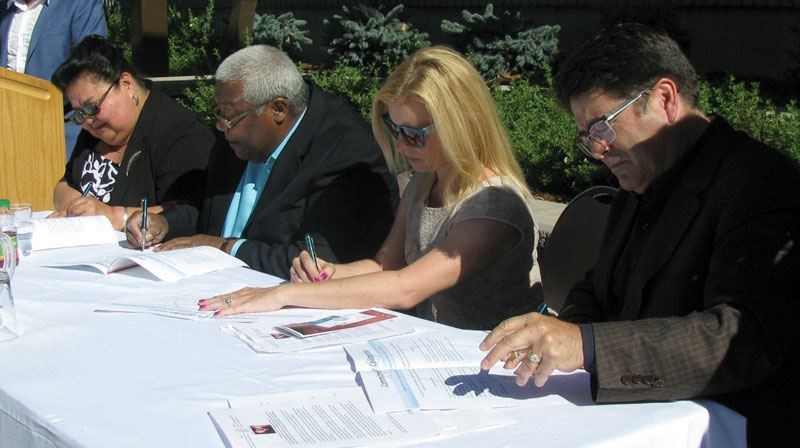People don't only want the chance to work, but where available, they want the chance to work in their community, according to a senior executive with an incoming liquefied natural gas project.
"These are exciting times here in the north," said Bruce Wells, vice-president of project development for TransCanada's Coastal GasLink pipeline prior to adding his signature to an agreement with the Prince George Nechako Aboriginal Employment and Training association (PGNAETA) and the company's Prince Rupert Gas Transmission pipeline.
The agreement is for more than $250,000 to support PGNAETA programs focusing on transferable workplace-based literacy and essential skills in Aboriginal communities.
"It is imperative that we are able to provide both quality and variety in skill development for our young still trying to enter the workforce and for those who have longed to embark on a trades career but did not have the literacy at the level required to be successful," said Karin Hunt, PGNAETA executive director.
Established in 1993, PGNAETA works focuses on human resources development of First Nations people in the province's northern interior.
The TransCanada donation would provide access for 48 Aboriginal students to participate in the federal government's 16-week Aboriginal Skills Employment and Training Strategy, administered out of PGNAETA's Aboriginal Gateway Training Centre.
The Aboriginal population is the fastest growing in Canada and ensuring that demographic has access to training is an important element to addressing the predicted skilled labour shortage, said Rebecca McElhoes, manager of the Prince Rupert Gas Transmission project.
Wednesday's announcement was the first step, said Wells, with TransCanada finalizing other partnerships as part of their Pathway to Pipeline Readiness program.
The proposed Coastal GasLink natural gas pipeline is proposed to be 650 kilometres long, running from near Dawson Creek to Kitimat. The Prince Rupert Gas Transmission project would run 900 kilometres from Hudson's Hope to Port Edward.
Both projects are in the environmental review stage.
Finding new partnerships and collaborations to fund training is key, said Terry Teegee, tribal chief of the Carrier Sekani Tribal Council.
Teegee has been on PGNAETA's board for the past five years and said he's seen a decline in funding opportunities and an increase in bureaucracy to access what's available.
"And I hope many other industries take a page out of this [agreement], whether it's forestry, mining, tourism, and we start building new relationships, accessing different funds," Teegee said. "Because quite simply, over the last 10 years relying on federal funds or provincial funds is not going to happen - there's a great decline in funds coming to our training society."
The training also has to go beyond skilled trades, Teegee added.
"We have to be in jobs that are in management, the higher level jobs, and that's really important for our people to really be gainfully employed in all aspects of industry," he said.



